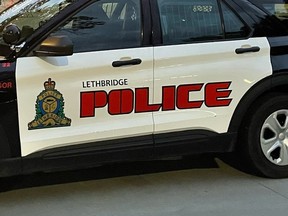
The head of the Lethbridge Police Association says a new civilian-led body will offer a “better way” to investigate misconduct allegations against municipal officers and speed up the process.
The Lethbridge Police Service (LPS) said this week that one of its officers — identified as Const. Joel Odorski — received a reprimand related to 2018 allegations of improper data access involving former Lethbridge-West MLA and NDP cabinet minister Shannon Phillips.
The disciplinary action concluded reviews of Phillips’ complaints against the LPS, other than her $400,000 civil suit, said Lethbridge police.
Jay McMillan, Lethbridge police union president, says it currently takes far too long for police conduct investigations to produce decisions. The interests of the public and officers are not served by long waits for outcomes, added McMillan.
He’s hopeful quicker decisions come about once a new arm’s-length agency, the Alberta Police Review Commission, begins operating by the end of 2025. Police misconduct is currently investigated by an internal professional standards body or a partner agency.
“For disciplinary (complaints), there’s potential for some good things to come from it,” said McMillan of the planned Police Review Commission.
“You want to be accountable, you want there to be some trust in the public, and that becomes difficult to maintain when it takes so long to establish any kind of decisions,” said McMillan.
“And I think some transparency and some independence in reaching those decisions won’t hurt us either.”
In June, LPS began its own internal investigation into the 2018 allegations of improper data access involving Phillips. The police service waited five years for the police watchdog agency, the Alberta Serious Incident Response Team (ASIRT), to conclude its investigation, said McMillan.
“That’s frustrating” he said, adding professional standards investigations are put on hold until statutory investigations are concluded.
The years of waiting for investigations to conclude have made for a difficult time for all LPS employees subjected to “noise and some of the garbage” swirling around without a decision being rendered, said McMillan.
“There’s been a lot of inaccurate and unfair things being said about the Lethbridge Police Serve as a whole,” he said.
In a statement to Postmedia, the LPS says it’s optimistic the new agency will ensure police misconduct is “addressed consistently across the province in a timely and transparent fashion that maintains public trust.”
“While there is much to be done yet, the Lethbridge Police Service appreciates and welcomes the consultation and hard work that has gone into the development of the Alberta Police Review Commission,” said LPS.
Because the commission will be arm’s length from government and police services, the public can have “greater confidence” that complaints will be investigated and resolved impartially, Green said in a Friday statement to Postmedia.
“Alberta’s government is collaborating closely with key partners, including Indigenous communities and law enforcement agencies, to help ensure accessibility for complainants and police officers and inform the development of policies and regulations and staff training that will support the launch the Police Review Commission by the end of 2025,” he said.
But the Criminal Trial Lawyers’ Association has withdrawn from the consultation process around the new body because it’s “stacked in favour of the police,” Edmonton lawyer Tom Engel said on X. Law enforcement are provided with “a special status to the exclusion of all other stakeholders” under the new commission, the CTLA wrote in a letter to Ellis.
The Police Review Commission, created in 2022 by a UCP government act amending the Police Act, will investigate serious and sensitive, statutory offences, and code of conduct complaints against police, according to the CEO job ad.
ASIRT will fall under the umbrella of the new agency and investigate serious and sensitive, and statutory offences. Police code of conduct complaints cover ones where officers are alleged to have violated regulations regarding their conduct or behaviour, but they are not “criminal in nature” or not deemed to be serious or sensitive.
“The Police Review Commission will investigate these complaints from beginning to completion and render a decision on whether a complaint has been substantiated or not. Disciplinary action may be taken as a result of a substantiated complaint,” says the Alberta government.